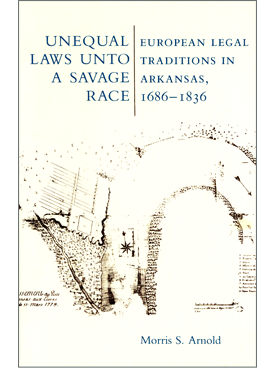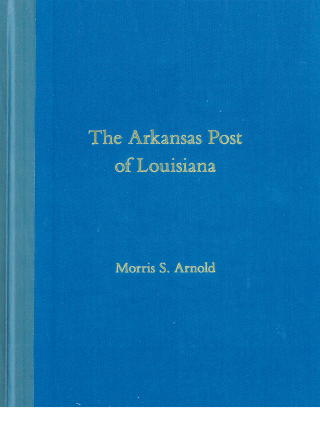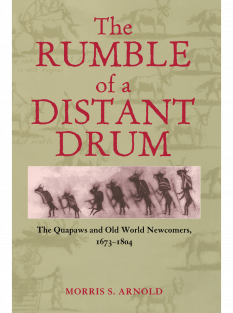Partly because its colonial settlements were tiny, remote, and inconsequential, the early history of Arkansas has been almost entirely neglected. Even Arkansas Post, the principal eighteenth-century settlement, served mainly as a temporary place of residence for trappers and voyageurs. It was also an entrepot for travelers on the Mississippi—a place to be while on the way elsewhere. Only a very few inhabitants, true agricultural settlers, ever established themselves a or around the Post.
For most of the eighteenth century, Arkansas’s non-Indian population was less than one hundred, and never much exceeded five or six hundred. Its European residents of that era, mostly French, have left virtually no physical trace: the oldest buildings and the oldest marked graves in the state date from the 1820s. Drawing on original French and Spanish archival sources, Morris Arnold chronicles for the first time the legal institutions of colonial Arkansas, the attitude of its population towards European legal ideas as were current in Arkansas when Louisiana was transferred to the United States in 1803. Because he views the clash of legal traditions in the upper reaches of the Jefferson’s Louisiana as part of a more general cultural conflict, Arnold closely examines the social and economic characteristics of Arkansas’s early residents in order to explain why, following the American takeover, the common law was introduced into Arkansas with such relative ease.
Morris S. Arnold, a native of Texarkana and president of the American Society for Legal History, received his LL.B. from the University of Arkansas in 1968. He also holds LL. M. and S.J.D. degrees from Harvard Law School where he specialized in legal history and was a Teaching Fellow in Law. From 1981 to 1984 he was the Ben J. Altheimer Distinguished Professor of Law at the University of Arkansas at Little Rock. He is presently Professor of Law and History at the University of Pennsylvania where he served as Vice President-Director of the Office of the President from 1979 to 1981.
“Arnold’s excellent study points the way forward to further development in our understanding of French and Spanish Louisiana. He has demonstrated the value of a detailed study of the posts, and shown that similar research will do much to help us understand what was happening in Louisiana both before and after the Purchase. … This is a book to be welcomed and enjoyed.”
—John W. Cairns, American Journal of Legal History, October 1989
“Morris S. Arnold, a law professor, traces the evolution and ultimate disappearance of civil law in Arkansas under successive administrations by the French, the Spanish, the French again, and finally the United States. Although the available sources are meager, Arnold has nevertheless successfully teased out of them a legal history of what was perhaps the most unsophisticated and remote frontier region in early American history.”
—Paul Finkelman, The Journal of Southern History, August 1986
“Morris Arnold’s description of the French and Spanish periods is just marvelous. It will be a classic for some time to come (or perhaps even forever).”
—Hans W. Baade




